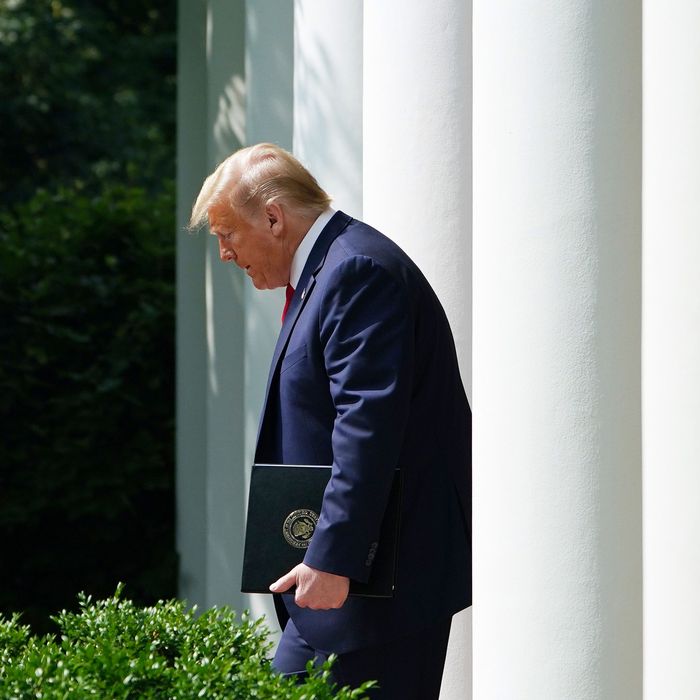
At the end of a very bad week for President Trump, fate suddenly seemed to smile on him Friday, June 5. The Bureau of Labor Statistics released a jobs report for May in which the official unemployment rate, while still higher than at any time since the Great Depression, went down slightly despite expectations that it would go up. Similarly, the report showed a small net gain in jobs when a fairly large loss was expected. While agreeing that this was welcome news, most economists warned that the numbers might be misleading, in part because BLS classified millions of furloughed workers as “employed,” and in part because the economy is still weak and the coronavirus pandemic is hardly over.
This did not keep Trump from using a Rose Garden presser to try to make sure every single American knew he had personally steered the nation out of danger, as I noted at the time:
During a press conference originally aimed at taking credit for a bill fixing problems with the Paycheck Protection Act, Trump launched into a rambling series of victory claims ranging from the economy to the coronavirus pandemic to the George Floyd protests to the border wall. He described the economic numbers as signaling “the greatest comeback in American history,” and “far better than a V[-shaped recovery]. This is a rocket ship.”
So excited was the president that he claimed George Floyd was looking down from heaven and celebrating Trump’s triumph: “This is a great day for him. It’s a great day for everybody.”
Like a lot of observers, I wondered if this promising economic news and Trump’s haste in personalizing it would lift his job-approval rating, the number most predictive of his odds of reelection, and one that had been sagging of late as assessments of his handling of the pandemic soured.
The early returns are in, and they provide no great news for the self-congratulating POTUS. A YouGov tracking poll with data from June 6–8 pegged his job-approval rating at a meh 40 percent. Morning Consult’s average for June 5–7 was 37 percent. And even Trump’s favorite polling outfit, Rasmussen, gave him a four-day average of 44 percent through June 8 (which FiveThirtyEight adjusts downward to 39 percent to reflect Raz’s partisan lean).
Overall, Trump’s approval-rating average is currently at 42.6 percent at RealClearPolitics and at 41.0 percent at FiveThirtyEight. Both numbers are the lowest Trump has registered since October of 2019.
Now it’s possible, of course, that the good economic news from last week hasn’t completely sunk in, and it’s definitely true that continued good economic news is good for Trump, as it would be for any incumbent president. But on the other hand, economic data seem to have had less to do with Trump’s approval ratings than the general impression he is making on the voters who are constantly being bombarded with his opinions and his image. His personal favorability rating (41.3, per RCP) is a better guide to his job-approval number than is his approval rating on the economy (50.7 percent, per RCP), which has remained relatively high during the pandemic even as the economy collapsed. If his stewardship of the economy is already what Americans like best about him, how much good will positive economic news do for him? Maybe not enough, particularly if the displays of dangerously erratic behavior (shown again in his reaction to the George Floyd protests) continue.
If Trump let gradually improving conditions in the country speak for him, then they might do him more good. As it is, his raging, divisive personality and endless pandering to his angry MAGA base speak loudest of all.
"popular" - Google News
June 10, 2020 at 06:29AM
https://ift.tt/2Ut4oe0
Economic ‘Comeback’ Is Not Making Trump More Popular - New York Magazine
"popular" - Google News
https://ift.tt/33ETcgo
Shoes Man Tutorial
Pos News Update
Meme Update
Korean Entertainment News
Japan News Update
Bagikan Berita Ini














0 Response to "Economic ‘Comeback’ Is Not Making Trump More Popular - New York Magazine"
Posting Komentar